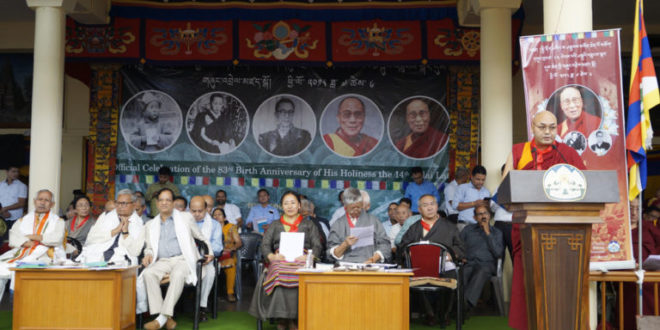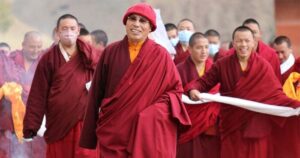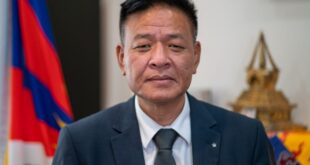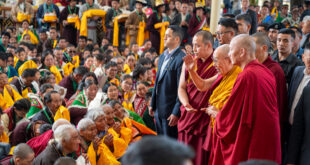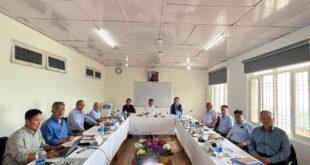On this 23rd day of the 5th month in the Earth-Dog Tibetan Royal Year 2145 in the 17th Tibetan Royal Sexantry, which corresponds to the 6th day of July 2018, we offer our prostrations to His Holiness the 14th Dalai Lama, the supreme protector-patron of all beings, including all sentient beings and the beings of the heavenly realms; the master of the entire corpus of the teachings of the Buddha on this earth; the spiritual lord of the trio of the desire, form and formless realms; a helmsman for peace in this world; the protector and refuge as well as the guiding light of all Tibetans, and their unsurpassable leader. With this precedence of the address on this momentous occasion of the birthday of His Holiness, I, on behalf of the Tibetan Parliament-in-Exile, offer my greetings and good wishes with a feeling of faith, reverence, and joy.
It was for the sake of all sentient beings in general and especially in connection with the relationship established by the destined fate and prayers of his spiritual subjects on the Snowland of Tibet that His Holiness the 14th Dalai Lama was born on the 5th day of the 5th month in the Wood-Hog Year of the 16th Tibetan Royal Sexantry, which corresponded to the 6th day of July 1935, in Domey Tagtser; with Choekyong Tsering being his father and Dekyi Tsering being his mother. As foretold unmistakably and without any possibility for misguidance in the prophecies of the tantric masters, spontaneous appearances of astoundingly miraculous objects and indications vouched for the authenticity of his birth. Since his physical birth on this earth at that time like the haloed appearance of the sun, His Holiness the Dalai Lama has now, by Tibetan tradition, attained 84 years of age, and by the outside universal calendar 83 years of age. And on this auspicious day of a hundred-thousand counts of joy marking the momentous occasion of his birth, when people in all corners of the world devote themselves to merit-accumulating positive deeds, bubbling with feelings of gladness, I on behalf of all Tibetans in Tibet and in exile, offer ardent entreaty and solemn prayers that His Holiness the Dalai Lama continues his noble deeds that flourish all across the globe. In doing so, I behold at all times his lotus-feet as the very embodiment of enlightenment with unalterable devotion, seeing him as remaining forever available to be the protector-patron to all sentient beings, a comrade-in-arms to them and being their great guiding light.
In countries and regions across the world on this day, Tibetans and peoples who covet peace are expressing their gratitude to His Holiness the Dalai Lama for his universally known and devoted three commitments, his promotion of the ancient Indian cultural traditions and other universally acclaimed deeds and his provisions of guidance to them, by means of observing his birthday with a sense of joy, devotion and contentment. It goes to the very essence of marking the birthday of His Holiness the Dalai Lama that for all these reasons we should reiterate our pledge to devote ourselves to conduct our lives in such a way as to seek to become Tibetans endowed with a sense of ethics and caring towards others.
Over the past multitude of decades, His Holiness the Dalai Lama has especially devoted himself immensely to the well-being of all sentient beings on this earth in general, especially to the followers of the different religious traditions without any distinction regarding their doctrines and belief systems and particularly for the benefit of all Tibetans of the Snowland of Tibet, whether living in Tibet or in exile through his deeds of great magnitude. As a result, there has been an outpouring of his deeds and accomplishments in fields, both temporal and spiritual. In that way, he became, in a truly meaningful sense, a common source of benefits and well-being on this earth. In particular, in order to ensure the sustenance and rekindling of the Tibetan people’s struggle for their just cause, His Holiness the Dalai Lama initiated and guided the entirety of the exile Tibetan set up to the path of democracy. In specific terms, in order to reach a settlement on the basic issue of Tibet, His Holiness, in 1987, put forward a Five-Point Peace Plan in the Congress of the United States of America. Thereafter, in 1988, he presented his peace proposal to China on the Tibet issue at the European Parliament in Strasbourg. Likewise, he met and held discussions on successive occasions with a large number of political leaders and influential figures on the world stage, taking up with them, issues of such great importance as the natural environment of Tibet, the situation in Tibet under the Chinese rule and with regard to the Tibetan administrative set up in exile. These have resulted in governments as well as private entities and societies at large, of many countries in the East and West, and elsewhere too, showing concern and interest on the just cause of the Tibetan people on an unprecedented scale, leading to hundreds of auspicious doors of access being thrown wide open for it. They helped to lay bare the fact that the Tibetan people remain steadfastly committed solely to the nonviolent method of pursuing their just cause. This has been an auspicious accomplishment of His Holiness the Dalai Lama of great reverberations, like the universal ray of sunlight immune to the futile attempt of its eclipse with one’s palm. It led to His Holiness the Dalai Lama being honoured with the Nobel Peace Prize in 1989, with the Congressional Gold Medal of the United States Congress in 2007 and the Templeton Prize in the United Kingdom in 2012 – all awards of great renown. These have been parts of hundreds of certificates and awards that His Holiness the Dalai Lama has received over the years. And His Holiness continues to remain in pursuit of his deeds of exceptional importance and relevance which he carries out in tandem with the transformative changes taking place in this world. In particular, His Holiness has, with a great consideration pursued to reach a solution that is mutually beneficial to Tibet and China through dialogue, explained his accommodative position on numerous occasions, eschewing any dispute with the government of China on the historical status of Tibet.
However, even to this day, the government of China remains adamant in refusing to make any positive change in its policy towards the issue of Tibet. On the contrary, the restrictions being imposed in places all across Tibet continue to be tightened. Take the case, for example, of what happened in the Chamdo region of what is called the Tibet Autonomous Region during the religious festive month of Sakadawa recently. A coercive order was issued banning all the school-going Tibetan children and their parents from visiting temples to offer worship and receive blessings and taking part in any sort of religious gathering. This alone makes obvious the extent of the coercion employed by the government of China in preventing the Tibetan people from exercising their religious freedom. In the annual International Religious Freedom Report for 2017 released recently by the State Department of the United States government, the depth of the deprivation of religious freedom in Tibet, described as extreme, was clearly pointed out. Not only that, the report emphatically pointed out that China was implementing in Tibet, a policy on religious freedom that was entirely incompatible with the sentiment of the Tibetan people, including in the matter of recognizing the reincarnations of Lamas and Tulkus, which had been subjected to government control and supervision.
The government of China in January 2016 arrested Tibetan language rights activist Tashi Wangchuk and put him on trial before what is described as the Yulshul Intermediate People’s Court in Yulshul Prefecture of Qinghai Province in January this year. And on the 22nd of May this year, he was sentenced to five years of imprisonment for supposedly having committed the crime of inciting separatism. But the Human Rights Council of the United Nations, the Subcommittee on Human Rights of the European Parliament, the State Department of the United States, and many others have strongly criticized the Chinese government’s action, saying that the trial proceedings and the decision were grossly unfair and trampled on fundamental rights of citizens. And they made emphatic calls for the immediate release of Tashi Wangchuk from prison.
The situation concerning human rights in Chinese-ruled Tibet has been deteriorating tremendously on a daily basis. Tibetans continue to be subjected to arbitrary arrests and detentions. They continue to be tried and sentenced in arbitrary manners to jail terms on charges based on political considerations. There is no freedom of speech and expression. Likewise, health and medical facilities are poor and minimal. The Chinese government’s policy in Tibet is designedly discriminatory, favouring those who are ethnically Chinese and prejudiced against those who are ethnically Tibetan. Under this policy, the Tibetan people are subjected to especially more and considerably greater amounts of restrictions, with the result that today the very survival of the unique Tibetan religious traditions; language, script and culture; and their customs and traditions is at stake, threatened with eventual and nothing less than complete disappearance. On the opening day of the 38th session of the United Nations Human Rights Council in the Swiss city of Geneva on Jun 18 just recently, its head, Prince Zeid Raad Zeid al-Hussein, the United Nations High Commissioner for Human Rights, strongly criticized the government of China for its deplorable human rights record. Besides, he said, over the past five years, Beijing did not allow his staff an unfettered access to the country, including in Tibet and Xinjiang. And he said the human rights situation in regions such as Tibet and Xinjiang Uyghur region was fast worsening, thereby, laying bare the true state of affairs there.
Likewise, the situation concerning the natural environment of the Tibetan Plateau too has been deteriorating markedly. In the area known as Lhuntse Dzong in Lhokha prefecture of Tibet, China has been carrying out the project to extract and take away precious minerals such as gold and copper, estimated to be worth about US $ 60 billion. It has also announced plans to begin building three new civil airports in Lhokha, Shigatse and Ngari regions of Tibet in 2019. These regions are incidentally close to the borders of the neighbouring countries of India, Bhutan and Nepal. In addition, there is a plan to build a railway line running from Chinese-ruled Tibet to the capital city of Nepal. All these projects represent serious security threats to these neighbouring countries too. In order to build the new airports, the government of China has confiscated the agricultural land of the local Tibetan farmers with payment of only token amounts of money as compensation, rendering it all but certain that these hapless Tibetans will face serious livelihood problems. The overriding goal of the government of China is to speed up the transfer of Chinese immigrant population into Tibet and to bolster its military strength in the border regions. Projects such as these have not led to any improvement whatsoever in the living conditions and so on of the local Tibetan people. Rather, they have led to adverse effects on the ecology of its natural environment. In many parts of the so-called autonomous region of Tibet, the government of China has deployed combat troops, stored nuclear arms and carries out military exercises. Military activities of these and other kinds have led to immeasurable damages to the land.
On the 9th of May this year, a delegation of the National People’s Congress, the Chinese Parliament, from the so-called Tibet Autonomous Region took part in a hearing conducted by the Canadian Parliament’s Standing Committee on Foreign Affairs and International Development in order to publicize their claims about the situation there. But contrary to what the real situation in Tibet was, the delegation only regurgitated the propaganda that the government of China has routinely been churning out. Nevertheless, members of the committee grilled the delegation members with pointed questions on issues such as the status of the Sino-Tibetan dialogue; the situation concerning the condition and whereabouts of the 11th Panchen Lama, Gedhun Choekyi Nyima; on the imprisonment of the Tibetan language rights activist Tashi Wangchuk; and on other related matters. Likewise, the Standing Committee on Foreign Affairs and International Development of the Canadian Parliament on June 12 granted a great opportunity of a hearing on the urgency of the current situation in Tibet. On that occasion, Sikyong of the Central Tibetan Administration and a delegation from Tibetan Parliament-in-Exile took part in the hearing to avail the good opportunity and presented their testimonies on the actual situation in Tibet with presentations of substantive evidence to fully back their statements.
The mutually beneficial Middle Way Policy initiated by His Holiness the Dalai Lama in an effort to resolve the Sino-Tibetan dispute is a practical approach that is fully in accord with the reality of the current situation. There is nothing in it to lend itself to being interpreted as a disguised demand for independence, or a demand for a greater Tibet and the like terminological obfuscations. If the leaders of the government of China are truly desirous of carrying out a thorough investigation of this approach of ours, we will be the most welcoming of it. Recently, the United States Secretary of State-Mr Michael Richard Pompeo again expressed his support for the resumption of dialogue by the government of China with envoys of His Holiness the Dalai Lama. Given this fact, we take this opportunity to reiterate our call on the government of China, asking it too to adopt a policy of liberalization and make efforts to resume the dialogue between envoys of His Holiness the Dalai Lama and representatives of the government of China.
There had earlier been reports in sections of the internet and newspapers, referring to the health of His Holiness the Dalai Lama that could be nothing further from the truth. They were nothing but rumours based without any foundation of truth. And recently, in the month of June, after successfully concluding the programmes on his trips to the Baltic states in Europe of Lithuania and Latvia, His Holiness the Dalai Lama, upon landing at the Kangra Airport at Gaggal, personally declared that he is in good health. There is, therefore, no reason for the Tibetan people in Tibet and in exile, to be worried on this account. However, on account of His Holiness the Dalai Lama’s advanced age, for the reason that this is the year before his next obstacle year and that the next year will be his actual obstacle year, it is pertinent for all the people of the Snowland of Tibet to strongly devote themselves unitedly to carry out merit-accumulating activities for the sake of his physical well-being. The main thing, however, is that there should be fraternal good relationship among the Tibetan people, whose sense of unity should be like the singularity of a sharp-edged chisel. All Tibetans, both in the government and in the private domain, should nurture and promote as much as they can, the religious traditions, the cultural heritage, and the spoken and written Tibetan language, of which they are the custodian. If they manage to do that, then it may also come for us to wish to make such grand religious offerings as to gladden His Holiness the Dalai Lama’s heart, including with a long-life prayer offering in all solemnity, in which case we emphatically call on all Tibetans to act with cooperative unity to make a common effort with even greater amount of diligence than ever before.
Sixty years are in the process of elapsing since the Tibetan people first arrived in exile. During that period, both the government and people of India have been the most generous in extending to us the requisite assistance, patronage and friendship of great magnitudes. With the sense of rectitude to feel gratitude for them at all times, we offer our utmost thanks to both the government and people of India. Likewise, to all the governments as well as peoples and organizations in the private domain all across the world, who have extended support on the issue of Tibet and provided assistance and help to the Tibetan people, we take this opportunity provided by the present momentous occasion to express our gratitude.
Finally, we hope and pray in all earnestness that His Holiness the Dalai Lama may live for a hundred aeons; that may all his aspirations be fulfilled with spontaneity; and that the just cause of the Tibetan people may prevail in all speediness.
By the Tibetan Parliament in Exile
6 July 2018
